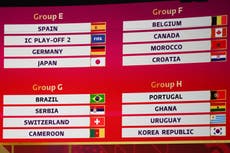Former US soccer goalkeeper Hope Solo arrested for drink-driving with two children in car
Solo won two Olympic gold medals and a World Cup during an illustrious 16-year international career
Former World Cup-winning US soccer goalkeeper Hope Solo was arrested for drink-driving and resisting arrest after police pulled her over while her two children were in the car.
Solo, 40, was arrested in a Walmart parking lot in Winston-Salem, North Carolina on Thursday, TMZ reported.
The two time Olympic gold medallist was processed at Forsyth County jail on charges of DWI, resisting arrest and misdemeanour child abuse.
Attorney Rich Nichols told TMZ that Solo was looking forward to the chance to defend the charges.
“She wants everyone to know that her kids are her life, that she was released immediately and is now at home with her family, that the story is more sympathetic than the initial charges suggest,” Mr Nichols said.
Solo made 202 appearance for the US women’s team between 2000 and 2016, winning the 2015 World Cup and 2008 and 2012 Olympic Games championships.
Known as a combative player who regularly courted controversy, Solo was suspended by the United States Soccer Federation in 2016 after calling the Swedish team a “bunch of cowards” following a quarter final loss in that year’s World Cup.
Solo is married to former Seattle Seahawks tight end Jerramy Stevens, and the couple have two-year-old twin boys.
Solo has been an outspoken critic of US Soccer during the US Women’s National Team’s legal battle to secure equal pay with the men’s team.
After a $24m settlement was struck in February, Solo said she felt it was a “heartbreaking and infuriating” failure.
In 2021, Solo claimed that her teammate Megan Rapinoe “almost” bullied teammates into kneeling during the national anthem.
She was arrested in Seattle in 2014 after allegedly assaulting her sister and 17-year-old nephew.
The charges were dismissed after the boy and his mother, Solo’s half-sister, refused to cooperate with police.
Solo received a warning from the US Anti-Doping Agency in 2012 after testing positive to the banned substance Canrenone.
She was allowed to play at the Olympics that year, and explained the drugs were contained in a medication prescribed to her for pre-menstrual purposes.




